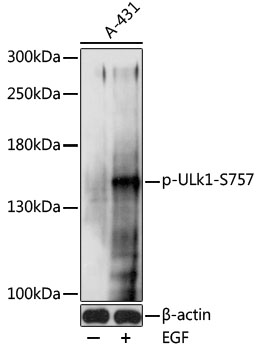-
Product Name
Phospho-ULk1-S757 pAb
- Documents
-
Description
Polyclonal antibody to Phospho-ULk1-S757
-
Tested applications
WB
-
Species reactivity
Human
-
Alternative names
ULK1 antibody; ATG1 antibody; ATG1A antibody; UNC51 antibody; Unc51.1 antibody; hATG1 antibody; serine/threonine-protein kinase ULK1 antibody
-
Isotype
Rabbit IgG
-
Preparation
Antigen: A synthetic phosphorylated peptide around S757 of human ULk1 (NP_003556.1).
-
Clonality
Polyclonal
-
Formulation
PBS with 0.02% sodium azide, 50% glycerol, pH7.3.
-
Storage instructions
Store at -20℃. Avoid freeze / thaw cycles.
-
Applications
WB 1:500 - 1:2000
-
Validations

Western blot - Phospho-ULk1-S757 pAb
Western blot analysis of extracts of A431 cells, using Phospho-ULk1-S757 pAb at 1:1000 dilution.A-431 cells were treated by EGF (100 ng/ml) at 37u2103 for 30 minutes after serum-starvation overnight.Secondary antibody: HRP Goat Anti-Rabbit IgG (H+L) at 1:10000 dilution.Lysates/proteins: 25ug per lane.Blocking buffer: 3% BSA.Detection: ECL Basic Kit .Exposure time: 10s.
-
Background
Serine/threonine-protein kinase involved in autophagy in response to starvation. Acts upstream of phosphatidylinositol 3-kinase PIK3C3 to regulate the formation of autophagophores, the precursors of autophagosomes. Part of regulatory feedback loops in autophagy: acts both as a downstream effector and negative regulator of mammalian target of rapamycin complex 1 (mTORC1) via interaction with RPTOR. Activated via phosphorylation by AMPK and also acts as a regulator of AMPK by mediating phosphorylation of AMPK subunits PRKAA1, PRKAB2 and PRKAG1, leading to negatively regulate AMPK activity. May phosphorylate ATG13/KIAA0652 and RPTOR; however such data need additional evidences. Plays a role early in neuronal differentiation and is required for granule cell axon formation. May also phosphorylate SESN2 and SQSTM1 to regulate autophagy.
Related Products / Services
Please note: All products are "FOR RESEARCH USE ONLY AND ARE NOT INTENDED FOR DIAGNOSTIC OR THERAPEUTIC USE"
